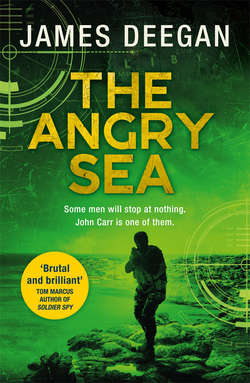Читать книгу John Carr - James Deegan, James Deegan - Страница 33
Оглавление20.
A FEW MINUTES’ walk along from the beach, John and George Carr were standing outside a bar, halfway down their first pints of San Miguel.
The place was as tacky as it got and it stank of stale cooking oil.
The street was busy with holidaymakers and loud with thumping bass from a nearby sound system, and the heat was still oppressive despite the overhead parasol.
John Carr was not impressed. He shook his head and took another deep, frothy swallow of lager – at least that was cold – as a group of fat, drunken Brits swayed towards them.
‘Fuck’s sake,’ he said as they turned for the entrance to the bar.
One of them – a big guy with a skinhead, a Millwall FC tattoo and a beer belly – clipped Carr as he passed.
‘Hey, watch yourself, pal,’ said Carr.
‘Or what?’ said the guy, stopping and staring at the Scotsman.
But when he saw the glint in Carr’s eyes, his tune changed.
‘Sorry, mate,’ he said, before slinking away inside the bar.
Carr watched him go, shaking his head in disgust.
‘Jesus,’ he said, under his breath. ‘You come here to get away from dickheads like that.’
‘Chill out,’ said George, grinning and holding up his beer. ‘You’re on holiday, for fuck’s sake. You need to get on it. Five or six of these and everything’ll look a lot better.’
‘Aye,’ said Carr, lifting his own pint. ‘Well, you’d better enjoy it because you’ll no be drinking once you’re in training.’
‘True,’ said George. He rolled his eyes. ‘Of course, Selection was much harder in your day.’
Carr chuckled. ‘I actually pity you, son,’ he said. ‘You havnae got a clue what you’re gonnae…’
But then he paused, glass in hand, and cocked his head.
Somewhere to their rear, a bang and then a rapid series of shorter, sharper reports.
‘What the fuck’s that?’ said George, his mind unable for a moment to assimilate the sounds of war with this environment.
But John Carr was already on the balls of his feet, his neck hair on end, pint glass thrown and gone, lager splashed on the dusty cobbles.
The detonation from the grenade was unmistakable, as was the crack and thump of the small arms.
‘That’s AK, George,’ he said. ‘A lot of fucking AK.’
AK, and screaming.
The hundred billion neurons in John Carr’s brain were pulsating with one almost overwhelming electrical impulse: Get down there, and get Alice.
But after taking two steps, he stopped.
Even when judged alongside other special forces soldiers, Carr had stood out for his singular ability to stay calm and to think clearly under extreme pressure.
He’d been in some very sticky spots indeed, but in the middle of the biggest firefights, often hundreds of klicks behind enemy lines, outnumbered, overrun, fighting for his very life, his pulse rate had barely ticked up from its customary 60bpm.
And he had never panicked.
It was just logical.
Panicking got you killed.
So he didn’t panic.
Not thinking got you killed, too.
So, although he was being tested now as never before, he stopped, and he stood, and he thought.
He could hear several weapons firing, perhaps as many as half a dozen.
People were already running past him, babbling, crying, freaking out.
Some of them wounded.
One guy holding his guts in, stumbling and dragging his bare feet, supported by two of his mates, his mouth slack, minutes from bleeding out.
Carr knew that he couldn’t just sprint onto the sand, because that would get him killed, and if he was killed he couldn’t help Alice.
But he needed to get eyes-on in order to formulate a plan.
To his left, George was staring at him, his own eyes wide with shock.
He’d joined the Parachute Regiment just after the Afghan draw-down.
He was fit and strong, and no doubt he was brave and well-trained, too.
But he was not tested, not hardened and tempered by battle.
And you never know how you’ll react in a contact until it happens.
For an instant, Carr saw him not as the young man he was, but as the child he’d been.
He was on the verge of telling his son to run and hide, to stay safe, when – as if reading his old man’s mind – George spoke.
‘Wherever you’re going,’ he said, ‘I’m coming with you.’
In that moment, Carr saw a soldier in front of him.
He knew he stood a better chance with some help.
‘Okay, son,’ he said. ‘But you listen to everything I say, understand? No rushing off. You stick by me.’
George nodded.
Then two police officers came into view, running, heads down, terrified, away from the shooting.
Father looked at son.
‘Those two,’ he said. ‘If they’re not going to use their weapons, we will.’
